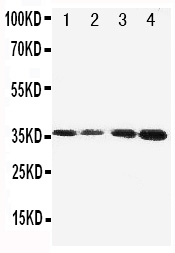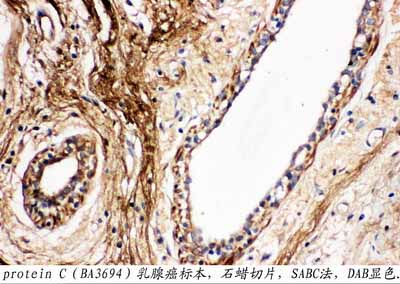Anti-Protein C Antibody
- SPECIFICATION
- CITATIONS
- PROTOCOLS
- BACKGROUND

Application
| WB, IHC-P |
|---|---|
| Primary Accession | P04070 |
| Host | Rabbit |
| Reactivity | Human |
| Clonality | Polyclonal |
| Format | Lyophilized |
| Description | Rabbit IgG polyclonal antibody for Vitamin K-dependent protein C(PROC) detection. Tested with WB, IHC-P in Human. |
| Reconstitution | Add 0.2ml of distilled water will yield a concentration of 500ug/ml. |
| Gene ID | 5624 |
|---|---|
| Other Names | Vitamin K-dependent protein C, 3.4.21.69, Anticoagulant protein C, Autoprothrombin IIA, Blood coagulation factor XIV, Vitamin K-dependent protein C light chain, Vitamin K-dependent protein C heavy chain, Activation peptide, PROC |
| Calculated MW | 52071 MW KDa |
| Application Details | Immunohistochemistry(Paraffin-embedded Section), 0.5-1 µg/ml, Human, By Heat Western blot, 0.1-0.5 µg/ml, Human |
| Subcellular Localization | Secreted . |
| Tissue Specificity | Plasma; synthesized in the liver. |
| Protein Name | Vitamin K-dependent protein C |
| Contents | Each vial contains 5mg BSA, 0.9mg NaCl, 0.2mg Na2HPO4, 0.05mg Thimerosal, 0.05mg NaN3. |
| Immunogen | A synthetic peptide corresponding to a sequence at the C-terminus of human Protein C(446-461aa HGHIRDKEAPQKSWAP). |
| Purification | Immunogen affinity purified. |
| Cross Reactivity | No cross reactivity with other proteins |
| Storage | At -20˚C for one year. After r˚Constitution, at 4˚C for one month. It˚Can also be aliquotted and stored frozen at -20˚C for a longer time.Avoid repeated freezing and thawing. |
| Sequence Similarities | Belongs to the peptidase S1 family. |
| Name | PROC |
|---|---|
| Function | Protein C is a vitamin K-dependent serine protease that regulates blood coagulation by inactivating factors Va and VIIIa in the presence of calcium ions and phospholipids (PubMed:25618265). Exerts a protective effect on the endothelial cell barrier function (PubMed:25651845). |
| Cellular Location | Secreted. Golgi apparatus Endoplasmic reticulum |
| Tissue Location | Plasma; synthesized in the liver. |

Thousands of laboratories across the world have published research that depended on the performance of antibodies from Abcepta to advance their research. Check out links to articles that cite our products in major peer-reviewed journals, organized by research category.
info@abcepta.com, and receive a free "I Love Antibodies" mug.
Provided below are standard protocols that you may find useful for product applications.
Background
Protein C(PROC), also called PC, is a zymogenic(inactive) protein, the activated form of which plays an important role in regulating blood clotting, inflammation, cell death and maintaining the permeability of blood vessel walls in humans and other animals. The PROC gene is mapped on 2q14.3. The PROC gene contains 8 exons and spans about 11 kb by Foster et al. The conversion of protein C to a protease with anticoagulant function by thrombin requires as a cofactor thrombomodulin, an endothelial cell membrane protein. Riewald et al. demonstrated that activated protein C uses the endothelial cell protein C receptor as a coreceptor for cleavage of protease-activated receptor-1 on endothelial cells. Faust et al. demonstrated that the endothelial pathways required for protein C activation are impaired in severe meningococcal sepsis. They stated that improvement in the outcome of children with meningococcal sepsis who were treated with unactivated protein C concentrates had been described in case reports and in 1 uncontrolled series.
If you have used an Abcepta product and would like to share how it has performed, please click on the "Submit Review" button and provide the requested information. Our staff will examine and post your review and contact you if needed.
If you have any additional inquiries please email technical services at tech@abcepta.com.













 Foundational characteristics of cancer include proliferation, angiogenesis, migration, evasion of apoptosis, and cellular immortality. Find key markers for these cellular processes and antibodies to detect them.
Foundational characteristics of cancer include proliferation, angiogenesis, migration, evasion of apoptosis, and cellular immortality. Find key markers for these cellular processes and antibodies to detect them. The SUMOplot™ Analysis Program predicts and scores sumoylation sites in your protein. SUMOylation is a post-translational modification involved in various cellular processes, such as nuclear-cytosolic transport, transcriptional regulation, apoptosis, protein stability, response to stress, and progression through the cell cycle.
The SUMOplot™ Analysis Program predicts and scores sumoylation sites in your protein. SUMOylation is a post-translational modification involved in various cellular processes, such as nuclear-cytosolic transport, transcriptional regulation, apoptosis, protein stability, response to stress, and progression through the cell cycle. The Autophagy Receptor Motif Plotter predicts and scores autophagy receptor binding sites in your protein. Identifying proteins connected to this pathway is critical to understanding the role of autophagy in physiological as well as pathological processes such as development, differentiation, neurodegenerative diseases, stress, infection, and cancer.
The Autophagy Receptor Motif Plotter predicts and scores autophagy receptor binding sites in your protein. Identifying proteins connected to this pathway is critical to understanding the role of autophagy in physiological as well as pathological processes such as development, differentiation, neurodegenerative diseases, stress, infection, and cancer.



